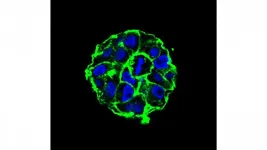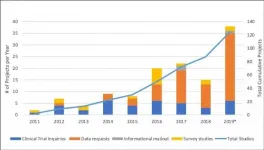Researchers at the University of Exeter and the University of Connecticut have previously found that men with two faulty genes that cause the iron overload condition haemochromatosis are more likely to develop liver cancer, arthritis and frailty, compared to those without the faulty genes.
Now, the team's new analysis of more than 335,000 people of European ancestry in UK Biobank, funded by the Medical Research Council and published in the Journal of Alzheimer's Disease, has found that men who carry the two faulty genes that cause haemochromatosis are more likely to develop dementia than men who do not carry any copies of the faulty gene.
The latest study analysed 2,890 men and women, aged 40-70 years with two faulty haemochromatosis genes (called HFE C282Y homozygous) in UK Biobank. The team found that 25 of the 1,294 men with the two faulty genes went on to develop dementia, which was 83 per cent more common than for those without the faulty genes. The team also found a build-up of iron in key areas of the brain linked to dementia, in a subset of men with two faulty genes that cause hemochromatosis. The same group of men were also significantly more likely to develop delirium, itself linked to dementia, over a ten-year follow-up. These findings could influence calls for the UK National Screening Committee to recommend screening for the condition, which is currently under consultation.
Haemochromatosis causes a build-up of iron around the body. An estimated 175,000 men and boys of European ancestry in the UK have the two faulty genes that cause haemochromatosis. The disorder is known as the "Celtic curse" because it is particularly prevalent in Celtic bloodlines. Reliable tests are available to identify those at risk - blood tests for measuring iron levels and genetic testing. Symptoms can include feeling tired all the time, muscle weakness and joint pains, meaning it is often misdiagnosed as the signs of ageing. Once diagnosed, the condition is easily treated by a process similar to donating blood several times a year, to lower iron levels.
Lead author Dr Janice Atkins, of the University of Exeter Medical School said: "We know that a build-up of iron in the brain is linked to dementia in people without haemochromatosis. Our study is the first to show that men with the mutations for haemochromatosis may have a substantially increased risk of dementia, although the numbers of people who develop dementia are still low. We now need more research to establish whether the genetic condition causes brain decline, particularly as haemochromatosis is easy to treat, and could be a route to preventing some dementia."
Professor David Melzer, who leads the research group in Exeter said: "In the past, there was debate about whether having the haemochromatosis faulty genes caused excess disease. It is now clear that these genes cause high rates of liver cancer and increased rates of several diseases including dementia. We now urgently need clinical trials of early diagnosis and treatment for people with the haemochromatosis genes in the UK, to pave the way to a screening program for this condition."
Of those 1,294 men with two faulty genes, 78 participated in an MRI study which included brain scanning. Their data were compared to 11,082 participants who did not have the two faulty genes. The brain imaging data on men with the two faulty genes for haemochromatosis found a build-up of iron in areas of the brain including the hippocampus and thalamus, known to be linked to memory.
Haemochromatosis tends to be more serious in men, with women partially protected because they lose iron through menstruation and childbirth, although some younger women do develop the disease. The study found no increase in dementia risk in women with faulty haemochromatosis genes.
Dr David Steffens, Professor and Chair of the Department of Psychiatry at the University of Connecticut School of Medicine and a co-author of the paper, noted: "This study adds to the list of modifiable factors that may point to prevention of dementia. If our results are replicated, it may become routine for clinicians to test for hemochromatosis in the evaluation of patients with memory complaints and in the screening of older asymptomatic patients."
Neil McClements, Chief Executive of the charity Haemochromatosis UK, said: "This study furthers our understanding of the toxic effects of excess iron on the body. It's important that families with genetic haemochromatosis get their relatives screened for the condition. Early diagnosis saves lives and improves quality of life, too."
The NHS advises that it is important to talk to your GP if you have a parent or sibling with haemochromatosis, even if you don't have symptoms yourself - tests can be done to check if you're at risk of developing problems. People are also advised to talk to their GPs about haemochromatosis if they have the following persistent or worrying symptoms - particularly if you have a northern European family background. Typical symptoms include feeling very tired all the time (fatigue); weight loss; weakness and joint pain. Also, some men with haemochromatosis develop an inability to get or maintain an erection (erectile dysfunction), and some women have irregular periods or absent periods. These symptoms usually come on between ages 30 and 60.
INFORMATION:
Useful links:
NHS: https://www.nhs.uk/conditions/haemochromatosis/
Patient charity: https://www.haemochromatosis.org.uk/
The paper is entitled "Hemochromatosis mutations, brain iron imaging and dementia in the UK Biobank cohort", by Janice L Atkins, Luke C Pilling, Christine J Heales, Sharon Savage, Chia-Ling Kuo, George A Kuchel, David C Steffens and David Melzer, and is published in the Journal of Alzheimer's Disease.
https://content.iospress.com/articles/journal-of-alzheimers-disease/jad201080
About the University of Exeter Medical School
The University of Exeter Medical School is part of the University of Exeter's College of Medicine and Health. Our mission is to improve the health of the South West and beyond, through the development of high quality graduates and world-leading research that has international impact.
As part of a Russell Group university, we combine this world-class research with very high levels of student satisfaction. Exeter has over 19,000 students and is ranked 12th in The Times and Sunday Times Good University Guide 2020.
The University of Exeter Medical School's Medicine course is in the top 10 in the Complete University Guide 2020.
The College's Medical Imaging programme is ranked in the top 5 in the Guardian Guide 2020 and the Complete University Guide 2020.
The University of Exeter entered the world top 20 for Biomedical and Health Sciences in the CWTS Leiden Ranking 2019, based on the percentage of publications ranked in the top 10 per cent most cited.
https://medicine.exeter.ac.uk/
About the Journal Alzheimer's Disease
Now in its 24th year of publication, the Journal of Alzheimer's Disease is an international multidisciplinary journal to facilitate progress in understanding the etiology, pathogenesis, epidemiology, genetics, behavior, treatment, and psychology of Alzheimer's disease. The journal publishes research reports, reviews, short communications, book reviews, and letters-to-the-editor. Groundbreaking research that has appeared in the journal includes novel therapeutic targets, mechanisms of disease, and clinical trial outcomes. The Journal of Alzheimer's Disease has a 2018 Journal Impact Factor of 3.909 according to Journal Citation Reports (SOURCE CLARIVATE, 2020). JAD is published by IOS Press. http://www.j-alz.com





